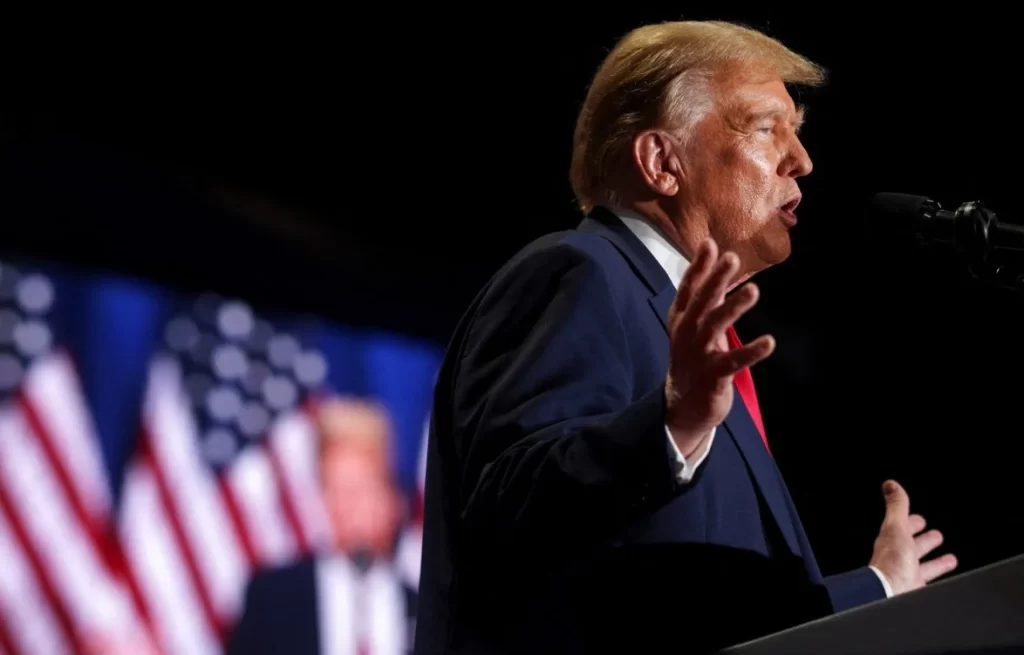
Former US president Donald Trump – IMAGE | Courtesy
In Summary:
- The US Supreme Court unanimously reverses Colorado’s decision to remove Donald Trump from the state’s Republican primary ballot.
- Trump’s eligibility was challenged due to his alleged involvement in inciting the January 6, 2021 Capitol riot, but the Court ruled in his favor, asserting that only Congress can enforce such provisions.
The United States Supreme Court has rendered a significant decision regarding Donald Trump’s appearance on the 2024 primary ballots, overturning Colorado’s attempt to exclude him from the state’s Republican primary ballot.
The unanimous decision, announced on Monday, comes after Colorado’s top court had initially sought to remove Trump from the ballot under the 14th Amendment of the US Constitution, which prohibits individuals from holding public office if they have participated in an insurrection.
Critics of Trump have accused him of instigating and supporting the attack on the US Capitol on January 6, 2021, in an effort to undermine the 2020 presidential election results.
Despite these accusations, Trump celebrated the Supreme Court’s decision as a “BIG WIN FOR AMERICA!!!” on his Truth Social platform, emphasizing his position as the frontrunner in the Republican presidential nomination race.
The ruling not only affects Colorado but also has implications for similar efforts in other states like Illinois and Maine, where Trump had faced challenges to his eligibility for the ballot.
The Supreme Court’s decision underscores the division of powers between states and federal offices, asserting that only Congress holds the authority to enforce provisions regarding insurrection or rebellion against the United States.
“We conclude that states retain the authority to disqualify individuals currently in or seeking state-level positions. However, states lack the constitutional authority to enforce Section 3 concerning federal positions, notably the presidency,” declared the highest US court in an unsigned opinion.
While the decision has been met with disappointment from critics who view Trump’s actions as a threat to democracy, others argue that the ruling does not absolve Trump of responsibility for the events of January 6th.
CREW President Noah Bookbinder expressed dissatisfaction with the Supreme Court’s decision, stating that the Court “failed to meet the moment” by allowing Trump back on the ballot.
Bookbinder emphasized that the ruling is “in no way a win for Trump”.
“The Supreme Court had the opportunity in this case to exonerate Trump, and they chose not to do so,” he stated.
“Every court — or decision-making body — that has substantively examined the issue has determined that January 6th was an insurrection and that Donald Trump incited it. That remains true today.”
While the Supreme Court allowed Donald Trump back on the ballot on technical legal grounds, this was in no way a win for Trump. The Supreme Court had the opportunity in this case to exonerate Trump, and they chose not to do so. 🧵https://t.co/onmfFB8atX
— Noah Bookbinder (@NoahBookbinder) March 4, 2024
Colorado Secretary of State Jena Griswold expressed her disappointment, emphasizing the importance of states’ ability to enforce constitutional provisions related to insurrection.
“Colorado should be able to bar oath-breaking insurrections from our ballot,” She noted this on X.
I am disappointed in the U.S. Supreme Court’s decision stripping states of the authority to enforce Section 3 of the 14th Amendment for federal candidates. Colorado should be able to bar oath-breaking insurrections from our ballot.
— Jena Griswold (@JenaGriswold) March 4, 2024
Despite this legal victory, Trump continues to face legal challenges over his efforts to overturn the results of the 2020 election.
Both federal and state-level cases are pending against him, with Trump vehemently denying any wrongdoing and attributing the legal actions to political motivations aimed at derailing his re-election campaign.
